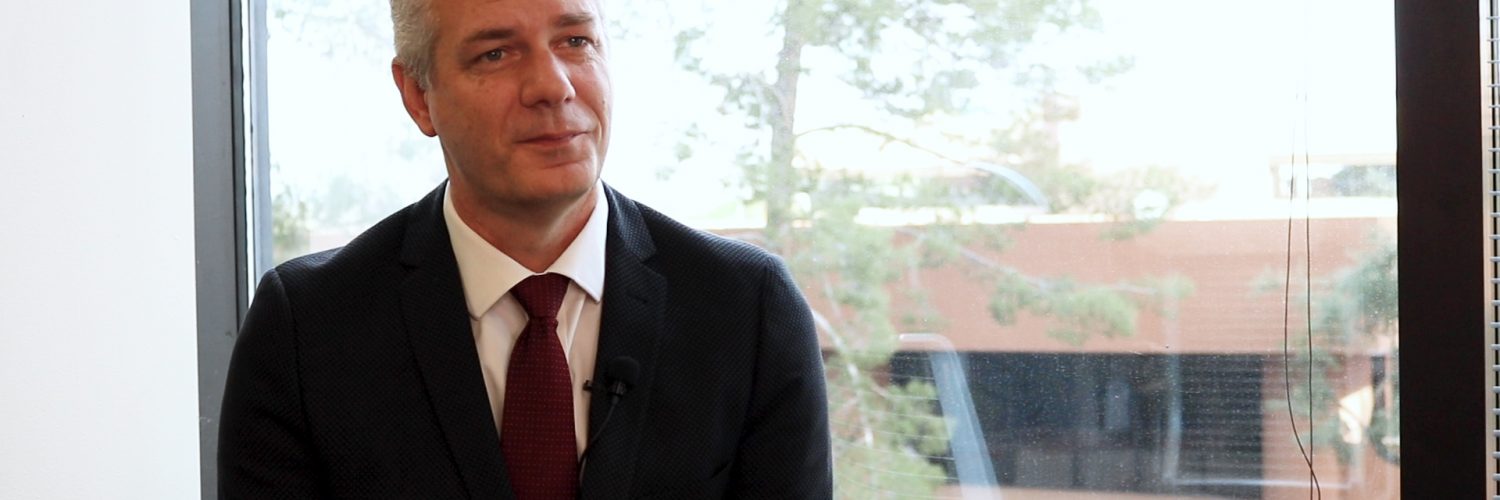John Arnold, executive director of the Arizona Board of Regents, has had his heart set on public service since he first saw a poster at Brigham-Young University advertising a public administration master’s program while training to be a tax accountant.
“I did an internship with Ernst and Young, in San Francisco, and came back from that and decided I didn’t want to be a tax accountant anymore,” Arnold said, recounting the first time public service sparked his interest. “[BYU] made a very generous offer to allow me into their [public administration] master’s program as I finished my master’s degree in accounting, and one thing led to another, and here I am.”
Early in his career, Arnold worked for the Arizona School Facilities Board, a public agency created by court mandate to assess, update and correct information on every physical facility in the state’s K-12 school system within a three-year window.
“Our team used to say we were flying the airplane while we were trying to build it,” Arnold said. “It was extremely challenging.”
About 10 years ago, Arnold was appointed state budget director under former Gov. Jan Brewer “in the midst of the worst recession since the Great Depression,” he said. At the time, Arizona had a $3.5 billion deficit — about 35 percent of the state budget — and Arnold’s team had two months to formulate a new budget to get the state back on its feet.
“I worked with Gov. Brewer and [former Chief of Staff] Eileen Klein and her team and put that together, and that was by far the most challenging thing I’ve ever done,” Arnold said.
Arnold said, of all the people he’s worked with in Arizona, Brewer stood out to him the most. He worked for her for six years and said he admires her more than “almost any other person” he’s been around.
“She is brilliant, lovely, kind but demanding,” Arnold said. “I can’t tell you how many times she and I fought over something, and she was right every single time. I learned so much from her and just am very grateful I had the opportunity to work with her.”
Arnold has worked for ABOR for four years and has been executive director for nine months. His primary responsibility is to implement the organization’s plans for higher education in Arizona, which come down to four main components: managing issues among the tens of thousands of employees and hundreds of thousands of students associated with Arizona’s three “dynamic” universities; providing leadership, vision, goals and direction for the universities; measuring and reporting goals to share the universities’ progress with the public; and improving the world by creating initiatives to get more Arizona students into higher education.
“Arizona has fewer students that go on to college than the national average,” Arnold said. “Nationally, about 70 percent of high school graduates enroll in a two- or a four-year program after high school; in Arizona, it’s only about 50 percent. We need to increase those numbers of our students that move past high school into higher education.”
The other main issue for state universities is finding the necessary funding to provide students with the quality of education they expect, Arnold said.
“During the recession, and while I was budget director with Gov. Brewer, we did a number of reductions to the universities and state support. What is the state’s responsibility in terms of financing our higher education?” Arnold said. “We certainly are in constant dialogue with the presidents and the financial model that they’ve developed to finance the universities, and our core goal is to provide access [for] Arizona students to a high-quality, four-year degree education.”
According to a recent report by the U.S. Census Bureau, Arizona has the fifth-highest poverty rate in the nation with nearly 18 percent of its residents living in poverty.
The state’s traditional role is to help finance students’ access to higher education, Arnold said. But the changes made during the recession “reversed” the financial model, placing a higher burden on the universities to cover the cost of tuition for in-state students, he said.
“Now, we’re out there competing on a national level to attract non-resident students and other dollars into our universities to help subsidize our resident students,” he said. “We do run very efficient institutions compared to the national average… and we certainly work with the governor’s office and the legislature for them to do their share, but we developed all kinds of business models to also attract revenues.”
ABOR cannot afford to finance every student that will go to college in Arizona, so it needs help from the state, Arnold said.
“We’ve asked the state to fund 50 percent of the cost of educating a resident student,” he said. “Our costs are very reasonable compared to other universities. We’re very efficient, but we need a little help in financing that access to those resident students.”
Higher education is “everything” to the Arizona business community, educating students so they can lead and perform the jobs necessary to move the state’s economy forward, Arnold said. But Arnold said he worries people think the universities are simply “producing employees,” because that is not the case.
“We’re producing a modern human being, for lack of a better term,” Arnold said. “More than just employees, we need to produce employers. We need to produce students and graduates that are going to go out and build the next economy in Arizona — not just go to work but really push Arizona forward into the 21st century and beyond.”
Higher education does much more than merely hand students a skill set with which to be successful in a job, he said.
“We need leaders, we need communicators, we need people that can really drive Arizona forward, and that’s what we’re trying to produce,” Arnold said.
When it comes to working at ABOR, Arnold said his favorite part is definitely the people. Each university president is “unique and fun in their own right,” and their leadership teams are “the most talented, dedicated people” he’s ever worked with, he said.
“Working not only with the staff here, which is terrific, and the regents themselves — they’re wonderful people,” Arnold said. “[I] just couldn’t ask for better people, and I admire them and enjoy them and like them and like being around them, and same with the university personnel.”
















Add comment